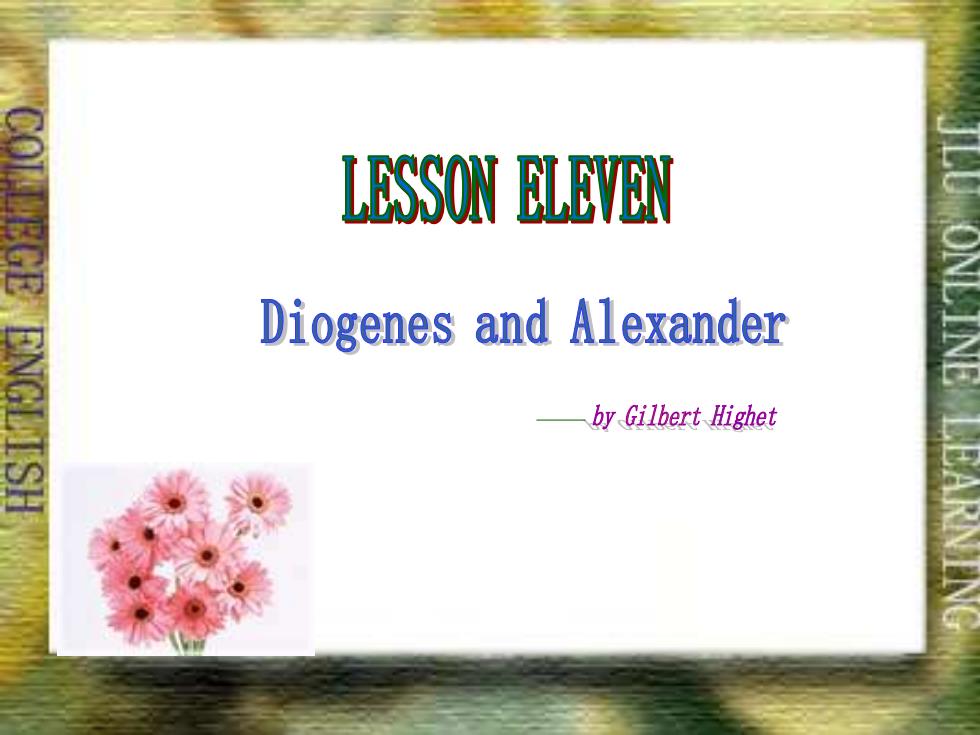
"COLLEGE ENGLISH LESSON ELEVEN Diogenes and Alexander —-by Gilbert Highet LU ONLINE LEARNING
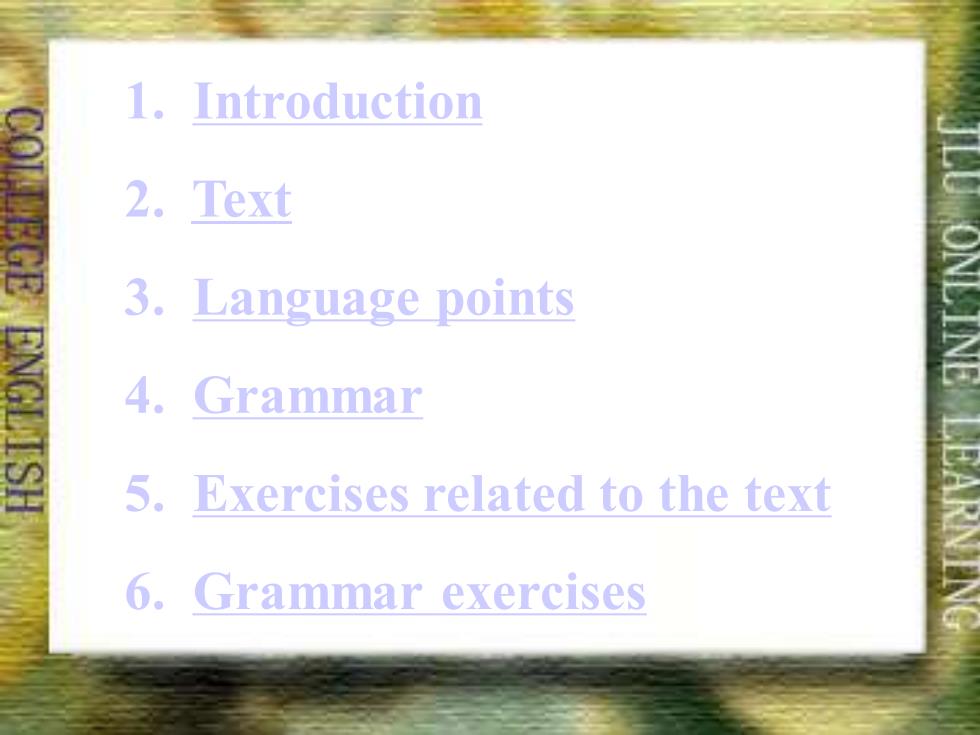
1.Introduction 2.Text 3.Language points 4. Grammar 5.Exercises related to the text 6。 Grammar exercises
1. Introduction 2. Text 3. Language points 4. Grammar 5. Exercises related to the text 6. Grammar exercises
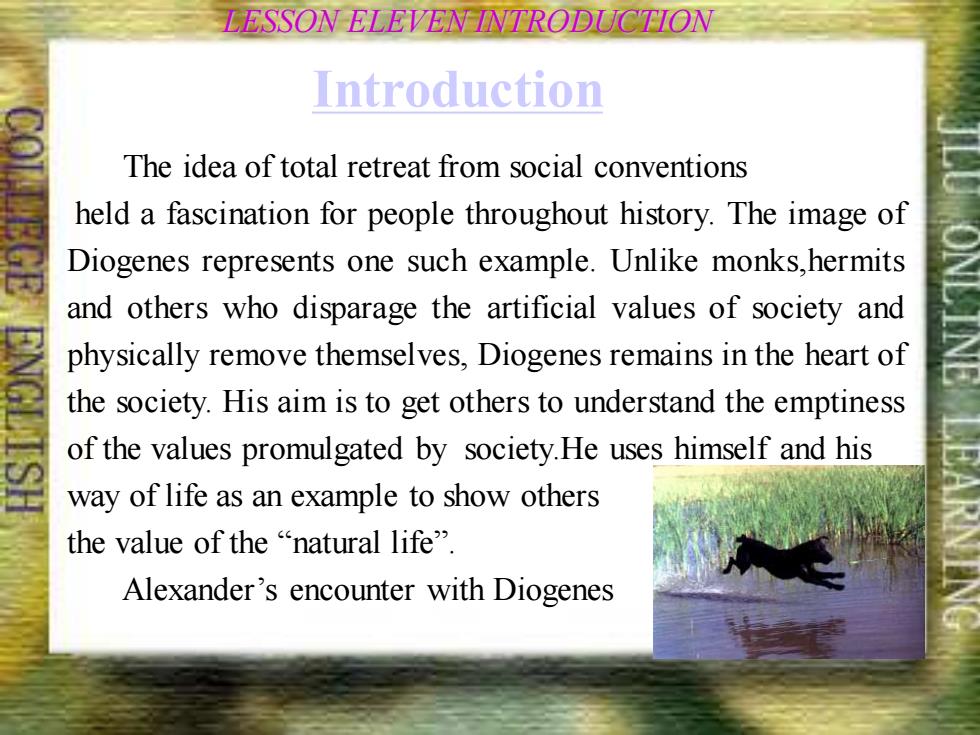
LESSON ELEVEN INTRODUCTION Introduction The idea of total retreat from social conventions held a fascination for people throughout history.The image of Diogenes represents one such example.Unlike monks,hermits and others who disparage the artificial values of society and physically remove themselves,Diogenes remains in the heart of the society.His aim is to get others to understand the emptiness of the values promulgated by society.He uses himself and his way of life as an example to show others the value of the“natural life'”. Alexander's encounter with Diogenes
Introduction The idea of total retreat from social conventions held a fascination for people throughout history. The image of Diogenes represents one such example. Unlike monks,hermits and others who disparage the artificial values of society and physically remove themselves, Diogenes remains in the heart of the society. His aim is to get others to understand the emptiness of the values promulgated by society.He uses himself and his way of life as an example to show others the value of the “natural life”. Alexander’s encounter with Diogenes LESSON ELEVEN INTRODUCTION
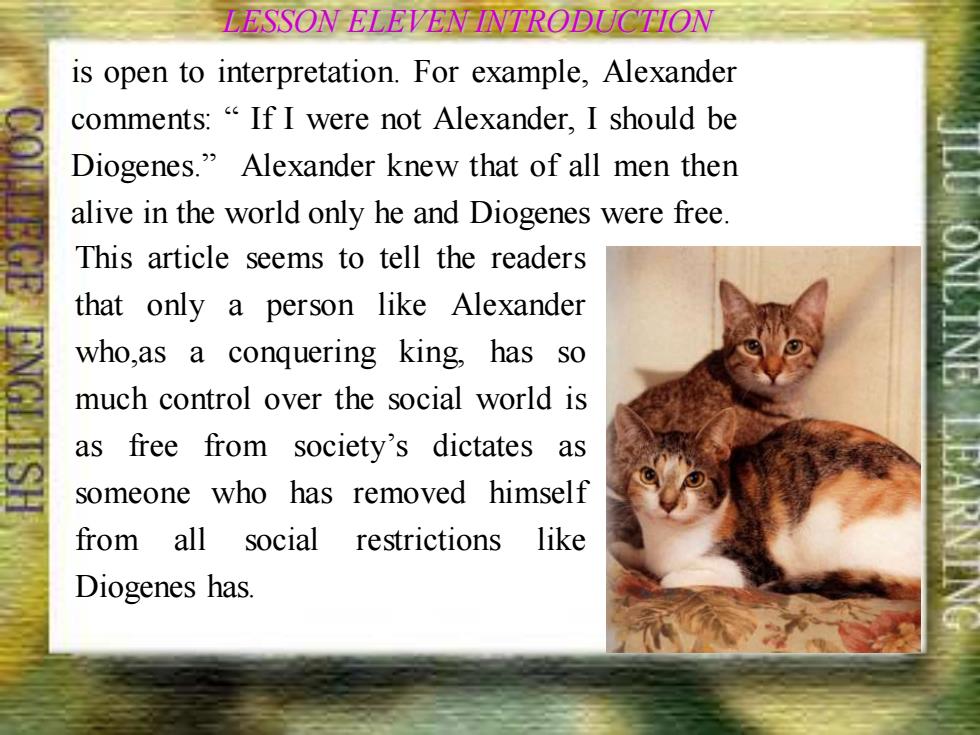
LESSON ELEVEN INTRODUCTION is open to interpretation.For example,Alexander comments:"If I were not Alexander,I should be Diogenes."Alexander knew that of all men then alive in the world only he and Diogenes were free. This article seems to tell the readers that only a person like Alexander who,as a conquering king,has so much control over the social world is as free from society's dictates as someone who has removed himself from all social restrictions like Diogenes has
is open to interpretation. For example, Alexander comments: “ If I were not Alexander, I should be Diogenes.” Alexander knew that of all men then alive in the world only he and Diogenes were free. This article seems to tell the readers that only a person like Alexander who,as a conquering king, has so much control over the social world is as free from society’s dictates as someone who has removed himself from all social restrictions like Diogenes has. LESSON ELEVEN INTRODUCTION
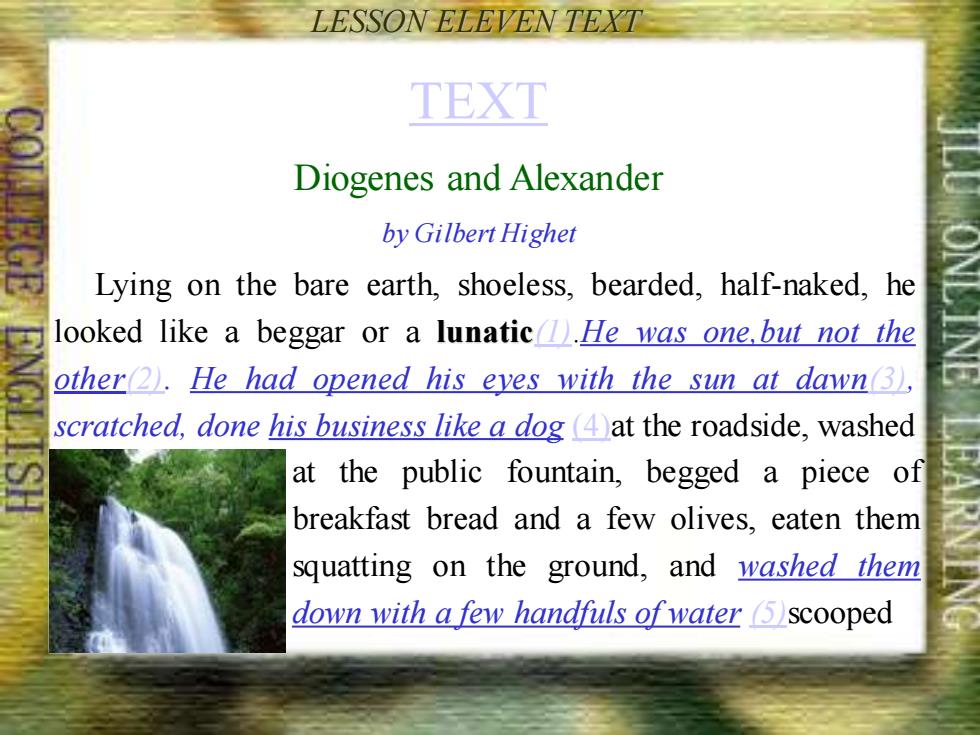
LESSON ELEVEN TEXT TEXT Diogenes and Alexander by Gilbert Highet Lying on the bare earth,shoeless,bearded,half-naked,he looked like a beggar or a lunatic .He was one,but not the other 2).He had opened his eyes with the sun at dawn 3), scratched,done his business like a dog (4 at the roadside,washed at the public fountain,begged a piece of breakfast bread and a few olives,eaten them squatting on the ground,and washed them down with a few handfuls of water (5 scooped
TEXT Diogenes and Alexander by Gilbert Highet Lying on the bare earth, shoeless, bearded, half-naked, he looked like a beggar or a lunatic(1).He was one,but not the other(2). He had opened his eyes with the sun at dawn(3), scratched, done his business like a dog (4)at the roadside, washed at the public fountain, begged a piece of breakfast bread and a few olives, eaten them squatting on the ground, and washed them down with a few handfuls of water (5)scooped LESSON ELEVEN TEXT
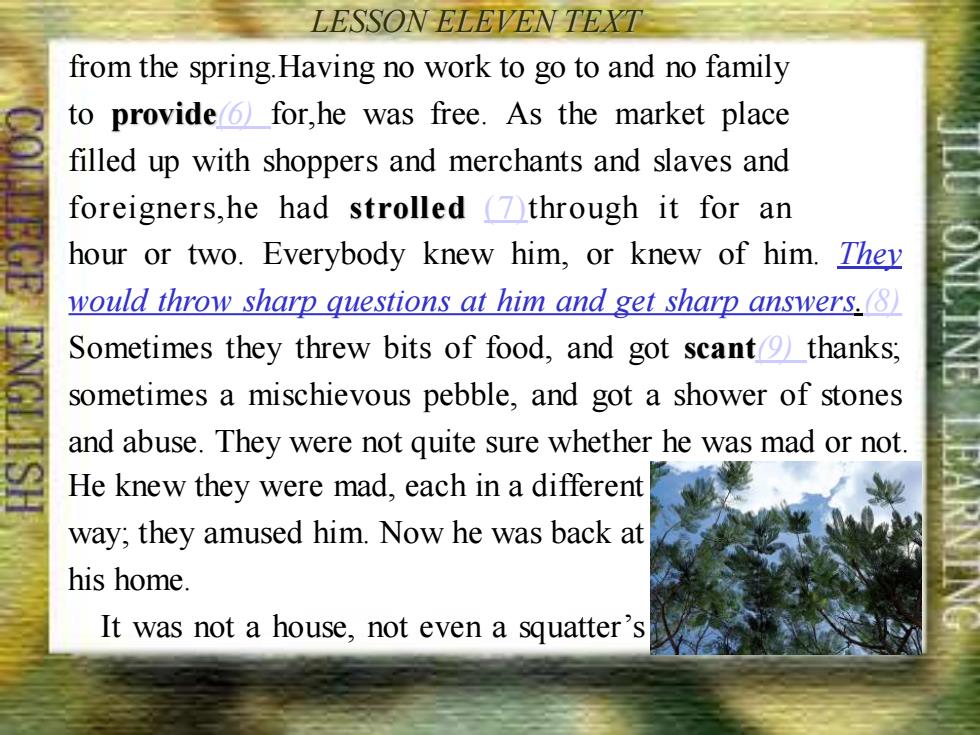
LESSON ELEVEN TEXT from the spring.Having no work to go to and no family to provide for,he was free.As the market place filled up with shoppers and merchants and slaves and foreigners,he had strolled (7through it for an hour or two.Everybody knew him,or knew of him.They would throw sharp questions at him and get sharp answers.(8) Sometimes they threw bits of food,and got scant thanks; sometimes a mischievous pebble,and got a shower of stones and abuse.They were not quite sure whether he was mad or not. He knew they were mad,each in a different way;they amused him.Now he was back at his home. It was not a house,not even a squatter's
from the spring.Having no work to go to and no family to provide(6) for,he was free. As the market place filled up with shoppers and merchants and slaves and foreigners,he had strolled (7)through it for an hour or two. Everybody knew him, or knew of him. They would throw sharp questions at him and get sharp answers.(8) Sometimes they threw bits of food, and got scant(9) thanks; sometimes a mischievous pebble, and got a shower of stones and abuse. They were not quite sure whether he was mad or not. He knew they were mad, each in a different way; they amused him. Now he was back at his home. It was not a house, not even a squatter’s LESSON ELEVEN TEXT
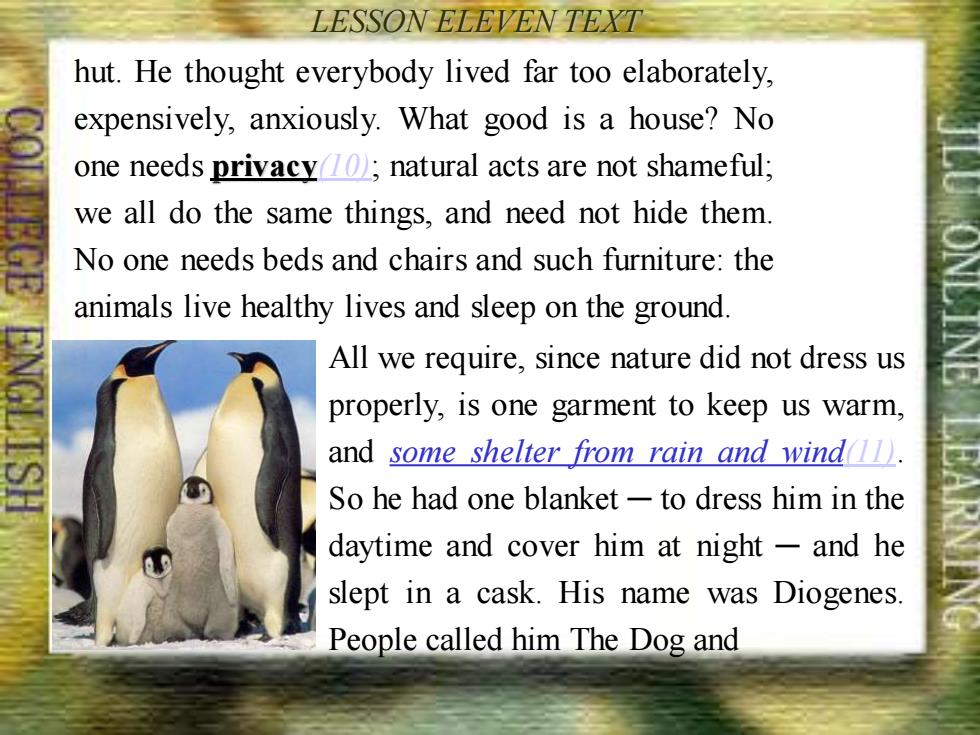
LESSON ELEVEN TEXT hut.He thought everybody lived far too elaborately, expensively,anxiously.What good is a house?No one needs privacy 10;natural acts are not shameful; we all do the same things,and need not hide them. No one needs beds and chairs and such furniture:the animals live healthy lives and sleep on the ground. All we require,since nature did not dress us properly,is one garment to keep us warm, and some shelter from rain and wind 11. So he had one blanket-to dress him in the daytime and cover him at night-and he slept in a cask.His name was Diogenes. People called him The Dog and
hut. He thought everybody lived far too elaborately, expensively, anxiously. What good is a house? No one needs privacy(10); natural acts are not shameful; we all do the same things, and need not hide them. No one needs beds and chairs and such furniture: the animals live healthy lives and sleep on the ground. All we require, since nature did not dress us properly, is one garment to keep us warm, and some shelter from rain and wind(11). So he had one blanket ─ to dress him in the daytime and cover him at night ─ and he slept in a cask. His name was Diogenes. People called him The Dog and LESSON ELEVEN TEXT
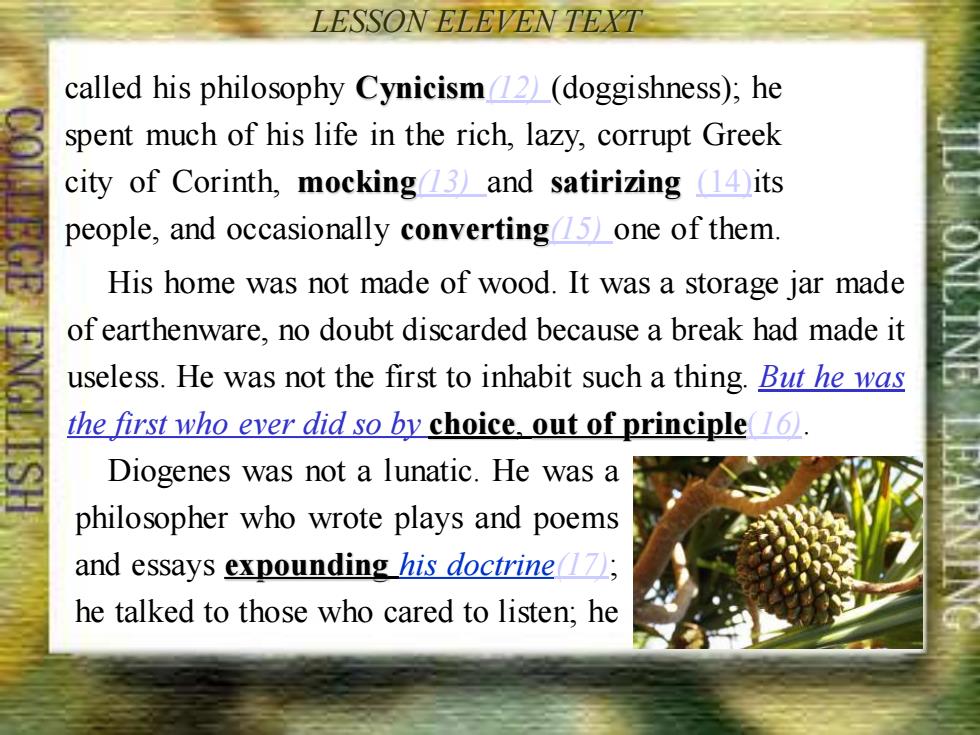
LESSON ELEVEN TEXT called his philosophy Cynicism 2(doggishness);he spent much of his life in the rich,lazy,corrupt Greek city of Corinth,mocking 3 and satirizing (14its people,and occasionally converting /5)one of them. His home was not made of wood.It was a storage jar made of earthenware,no doubt discarded because a break had made it useless.He was not the first to inhabit such a thing.But he was the first who ever did so by choice,out of principle(/6). Diogenes was not a lunatic.He was a philosopher who wrote plays and poems and essays expounding his doctrine 17; he talked to those who cared to listen;he
called his philosophy Cynicism(12) (doggishness); he spent much of his life in the rich, lazy, corrupt Greek city of Corinth, mocking(13) and satirizing (14)its people, and occasionally converting(15) one of them. His home was not made of wood. It was a storage jar made of earthenware, no doubt discarded because a break had made it useless. He was not the first to inhabit such a thing. But he was the first who ever did so by choice, out of principle(16). Diogenes was not a lunatic. He was a philosopher who wrote plays and poems and essays expounding his doctrine(17); he talked to those who cared to listen; he LESSON ELEVEN TEXT
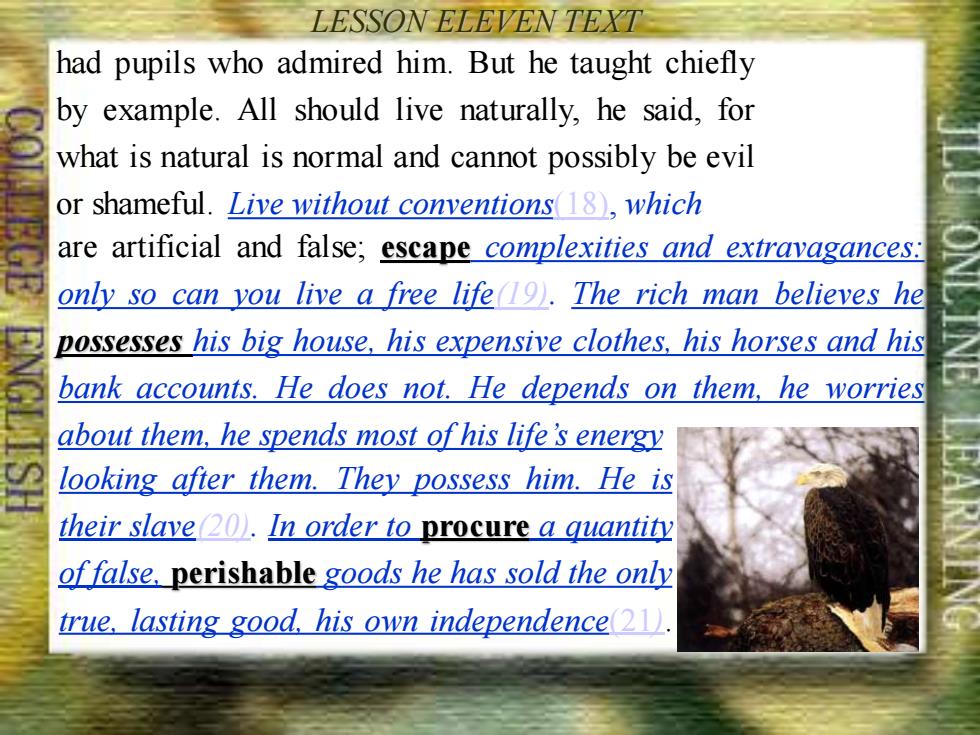
LESSON ELEVEN TEXT had pupils who admired him.But he taught chiefly by example.All should live naturally,he said,for what is natural is normal and cannot possibly be evil or shameful.Live without conventions(18,which are artificial and false;escape complexities and extravagances. only so can you live a free life 19).The rich man believes he possesses his big house,his expensive clothes,his horses and his bank accounts.He does not.He depends on them,he worries about them,he spends most of his life's energy looking after them.They possess him.He is their slave 20.In order to procure a quantity of false.perishable goods he has sold the only true,lasting good his own independence 1
had pupils who admired him. But he taught chiefly by example. All should live naturally, he said, for what is natural is normal and cannot possibly be evil or shameful. Live without conventions(18), which are artificial and false; escape complexities and extravagances: only so can you live a free life(19). The rich man believes he possesses his big house, his expensive clothes, his horses and his bank accounts. He does not. He depends on them, he worries about them, he spends most of his life’s energy looking after them. They possess him. He is their slave(20). In order to procure a quantity of false, perishable goods he has sold the only true, lasting good, his own independence(21). LESSON ELEVEN TEXT
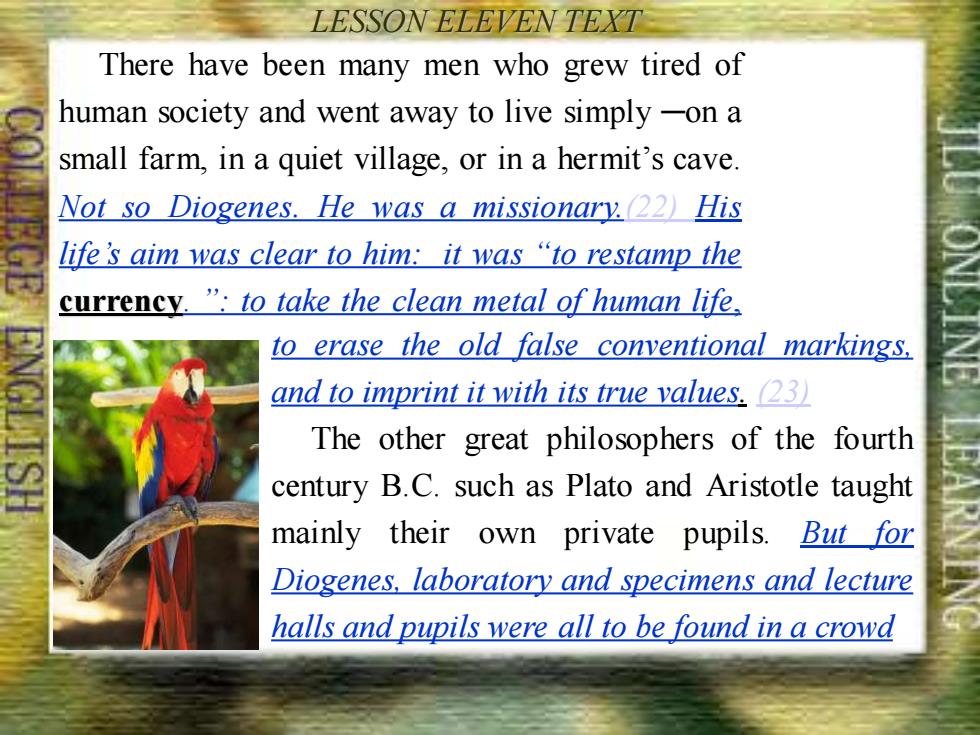
LESSON ELEVEN TEXT There have been many men who grew tired of human society and went away to live simply-on a small farm,in a quiet village,or in a hermit's cave. Not so Diogenes.He was a missionary.22)His life's aim was clear to him:it was "to restamp the currency."to take the clean metal of human life, to erase the old false conventional markings. and to imprint it with its true values.(23) The other great philosophers of the fourth century B.C.such as Plato and Aristotle taught mainly their own private pupils.But for Diogenes,laboratory and specimens and lecture halls and pupils were all to be found in a crowd
There have been many men who grew tired of human society and went away to live simply ─on a small farm, in a quiet village, or in a hermit’s cave. Not so Diogenes. He was a missionary.(22) His life’s aim was clear to him: it was “to restamp the currency. ” : to take the clean metal of human life, to erase the old false conventional markings, and to imprint it with its true values. (23) The other great philosophers of the fourth century B.C. such as Plato and Aristotle taught mainly their own private pupils. But for Diogenes, laboratory and specimens and lecture halls and pupils were all to be found in a crowd LESSON ELEVEN TEXT